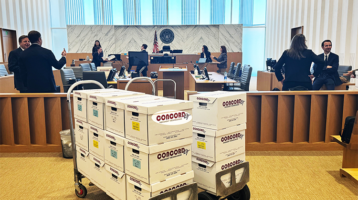Law firms are at a “watershed†in servicing e-discovery tasks for corporate clients, according to a survey released on July 22, sponsored by RVM Enterprises Inc. and conducted by Ari Kaplan Advisors.
Ari Kaplan, reporting on the survey, said that 30 law firm attorneys, who are primarily outside e-discovery counsel to corporate legal departments, were interviewed. All the attorneys practice in Am Law 200 firms—Twenty-two  of the participants are partners and 8 are senior e-discovery attorneys. All the attorneys surveyed recommend e-discovery software and vendors to their corporate clients.
The survey found, among other things, that law firms are finding innovative ways to service corporate clients who are demanding more transparency and cost reductions from outside counsel; and who are taking on more e-discovery roles in house.
Almost all survey respondents agreed that client expectations for practice support technology have changed—89 percent said the change is reflective of technology costs. Other reasons included the increasing speed of data creation and the volume of data.
A common theme identified by one respondent: “Clients think that e-discovery services should be part of the operating costs of the firm.†To counter this theme, firms need to convince clients and educate “counsel on why e-discovery services need to be on an invoice,†said another respondent.
According to the survey, firms are changing their e-discovery practices to strengthen their billing proposition by:
- Replacing deficient data processing vendors.
- Migrating to new software.
- Identifying and partnering with expert outside partners.
- Establishing a uniform approach to e-discovery tasks.
Short of making e-discovery services an operating cost, a large majority of survey respondents said that corporate clients equated greater efficiency with cost reductions. And that translates to “spotlighting strategies for mitigating risk in the most cost-effective manner possible,†observed Kaplan. For example, what is the risk of missing important documents if the client forgoes a second level of document review to save costs? Or aggressively culls documents in early-case review? Or cuts back on quality control mechanisms?
Another common theme identified by firm respondents: In-house lawyers are taking on more ownership of the corporation’s e-discovery effort. Rather than leaving key decisions to outside counsel, in-house legal departments are forging their own relationships with technology vendors and developing their own processes, balancing efficiency and risks “that comport with their internal strategy.â€
While e-discovery appears to be going in-house, an overwhelming majority of law firm respondents maintain the believe that adopting new technology can help law firms increase profitability for e-discovery services. The challenge then becomes a matter of “segmenting the billable work to reflect a firm’s traditional counseling role and its evolving position as a service provider in certain circumstances,†said Kaplan.


